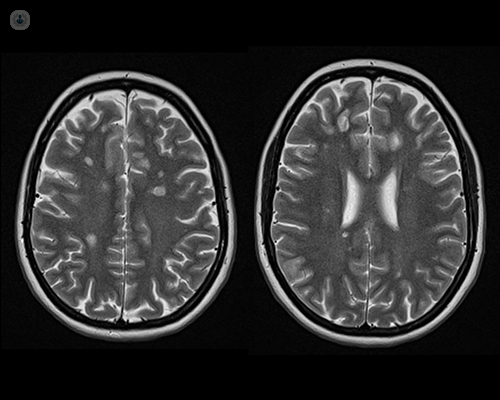A breakdown of multiple sclerosis
Written in association with:If not caught and treated early, multiple sclerosis may have life-changing impacts. The early signs are important to get examined and diagnosed to find the right treatment plan. In this article, expert consultant neurologist Dr Wallace Brownlee explains further what to look for and the important aspects of diagnosis and treatment of multiple sclerosis.

How common is multiple sclerosis?
Multiple sclerosis (MS) is a common, chronic neurological disorder in young adults. In the UK, about 1 in 500 people have MS and more than 100 people are diagnosed every week. MS can begin at any age, but most people develop their first symptoms between the ages of 20 and 40 years. MS is 2 or 3 times more common in women than men.
What are the early warning symptoms of multiple sclerosis?
MS can cause a range of symptoms depending on the part of the central nervous system involved. Common initial symptoms of MS include numbness, tingling or altered feeling in the limbs or the face, weakness in the legs or difficulty walking, dizziness or balance problems, double vision, and blurred vision.
What tests are helpful in making a diagnosis of MS?
The key investigation for making a diagnosis of MS is an MRI scan of the brain and spinal cord looking for areas of demyelination, or lesions due to areas of inflammation and scarring. A spinal fluid examination with a lumbar puncture to look for oligoclonal bands, a sign of inflammation, may be needed.
Why is an early diagnosis of MS so important?
If left untreated, then MS can have very serious consequences. It's important to make an early, accurate diagnosis so that treatment can be given to prevent relapses, new lesions forming on MRI scans, and ultimately long-term disability.
What treatment options are available for people with MS?
There are now 17 different treatment options for MS available in the UK. The treatments differ in the administration, effectiveness, side effects, and monitoring requirements. Selecting an appropriate treatment plan for people with MS needs to take into account their symptoms, MRI findings, other health conditions, and in women plans for pregnancy in the future.
When should people with MS take steroids?
A short course of high-dose steroids is sometimes recommended in people with an MS relapse to speed up recovery. Steroids can be given by mouth or intravenously through a drip at the hospital. Common side effects from steroids include metallic taste, indigestion, difficulty sleeping, and mood swings.
If you think you may be experiencing some symptoms of MS or would like more information, you can go to Dr Brownlee’s profile and schedule a consultation.


